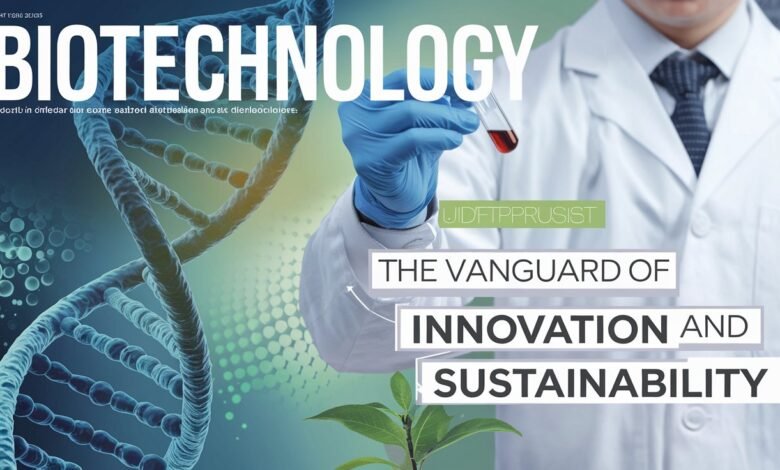
Introduction: The Age of Biotechnological Revolution
Biotechnology is no longer just a niche; it has grown into a cornerstone of modern innovation. From curing genetic diseases to reducing industrial carbon footprints, biotechnology is reshaping industries and affecting real-life changes. Due to gene editing breakthroughs, personalized medicine, and sustainability, the field is observing unprecedented growth in 2024. The article probes deep into the transformative power of biotechnology, its recent advances, challenges, and future views.
—
The Many Faces of Biotechnology
Biotechnology is used in many areas that have the potential to answer some of humanity’s biggest challenges. Some of the most relevant fields where the use of biotechnology can bring important benefits are analyzed below.
1. Gene Editing and CRISPR Technology
CRISPR-Cas9 has been a game-changing gene-editing tool, really opening up the possibilities of genetic engineering. It allows for precise modifications in DNA and thus gives hope for the treatment of genetic disorders such as sickle cell anemia and cystic fibrosis. In 2024, more clinical trials are being carried out with CRISPR for diseases like cancer and even rare genetic conditions. And with collaborations between research institutions and biotech firms, therapies could enter mainstream healthcare soon.
2. Personalized Medicine: Custom Healthcare Approach
Instead of the one-size-fits-all approach to healthcare, biotechnology is now applied to personalize health treatments by understanding an individual’s gene composition. It greatly enhances the effectiveness of the treatment and minimizes side effects associated with various diseases, including oncology and rare disorders. By identifying such genetic markers, for example, genomic sequencing helps doctors select the best therapies for cancer patients.
3. Stem Cell Therapy and Regenerative Medicine
Stem cell research has seen remarkable advancements, offering solutions for diseases once deemed untreatable. Stem cells can differentiate into various cell types, opening avenues for regenerating damaged tissues and organs. In 2024, applications in regenerative medicine are advancing rapidly, particularly in treating spinal cord injuries and heart diseases. Stem cell banking has also gained traction, allowing individuals to store stem cells for potential future medical use.
4. AI in Drug Discovery
Artificial Intelligence is smoothing the process of drug discovery. Where it used to take years to identify and test potential drug candidates, now AI-driven platforms can analyze vast datasets for predictions on the efficacy and safety of drugs, reducing years of development time down to months. This efficiency is critical in ensuring quick responses to global health crises-for example, the rapid development of vaccines during pandemics.
5. Biotechnology in Sustainability
Biotechnology’s impact is not limited to healthcare. For example, synthetic biology allows the transformation of industrial waste into usable material, such as biofuels and biodegradable plastics. Companies are using these technologies to manufacture sustainable products, which reduce environmental footprints and help contribute to a circular economy.
—
Challenges in Biotechnology
Despite its potential, biotechnology faces a number of challenges:
– Regulatory Hurdles: The pace of innovation often outstrips regulatory frameworks, delaying the approval and adoption of new therapies and technologies.
– Ethical Concerns: Gene editing and stem cell research raise ethical questions, particularly around issues like genetic privacy and the potential for misuse in creating “designer” organisms.
High Costs and Accessibility: Advanced biotechnological treatments and tests of genetic makeup remain costly and hence inaccessible to the common man. How innovation is made affordable will be a challenge for the industry.
—
Future Prospects: Biotechnology’s Expanding Horizons
Looking ahead, the future of biotechnology is incredibly promising. Key trends include:
– Next-Generation Gene Editing: Innovations in CRISPR and other gene editing tools will allow for even more precise and far-reaching applications-inside the living cell that could cure diseases at their genetic roots.
– Integration with Smart Technologies: Convergence of Biotechnology with Digital Technologies, including AI and IoT, will drive diagnostics and monitoring of health conditions intelligently.
– Global Health Solutions: Biotechnology is going to play a very vital role in solving global health challenges, pandemics, and even the development of vaccines. A good example of the capabilities of biotech is the rapid production of mRNA vaccines during the COVID-19 pandemic.
– Sustainability Initiatives: Further developments in synthetic biology will continue to contribute to making sustainable materials, thus providing environmentally friendly alternatives in many industries.
—
Conclusion: The Role of Biotechnology in Shaping the Future
There is no doubt that biotechnology is one of the most transformative fields of the time. It reaches from healthcare to agriculture and sustainability, and into solving some of the world’s current challenges. As gene editing, personalized medicine, and AI continue to evolve, the potential for biotechnology to improve lives and protect our planet is further increased. Yet, much work remains in navigating ethical dilemmas and ensuring equity of access to these innovations.
At CybaPlug.net, we firmly believe that understanding the capabilities and limitations of biotechnology provides a surefooted path toward the shaping of a future where science and technology go hand-in-hand for the betterment of mankind. And the age of biotechnology is here; its story has just begun.
—
By CybaPlug.net, your trusted source for insights into the latest technological frontiers.
Hello, my name is Alfie and I live on the Isle of Wight. I love Cricket, Snooker, Mountain Biking, Goalkeeping, Art, Golf, and Film Making!





